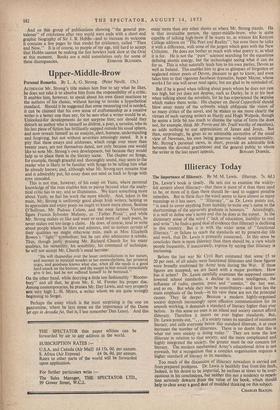Upper-Middle-Brow
Personal Remarks. By L. A. G. Strong. (Peter Nevill. 15s.) AurmouGH Mr. Strong's title makes him free to say what he likes, he does not take it to absolve him from the responsibility of a critic. It enables him, however, to speak about his own direct reactions to the authors of his choice, without having to invoke a hypothetical standard. Should it be suggested that some measuring rod is needed, it can be claimed that his own sense of craftsmanship as a creative writer is a better one than any, for he sees what a writer would be at. Unlooked-for developments do not surprise him; nor should they disturb an author who is himself so diverse, a poet, a novelist, who in his last piece of fiction has brilliantly stepped outside his usual sphere, and now reveals himself as an essayist, alert, humane, understanding and forgiving, but not without severities amusingly stated. It is a pity that these essays and addresses, which range over more than twenty years, are not themselves dated, not only because one would like to note Mr. Strong's own development, but because they would help us to place them in the literary scene. The chapter on Synge, for example, though graceful and thoroughly sound, may seem to the reader who is likely to be familiar with Synge to be telling him what he already knows; and, although what Mr. Strong says remains true and is admirably put, his essay does not send us back to Synge with eyes unsealed. This is not true, however, of his essay on Yeats, where personal knowledge of the man enables-him to pierce beyond what the analy- tical critic has to say, and so illuminates. We learn something more about Yeats, so feel his work the more wholly. And, taken in the main, Mr. Strong is uniformly good about Irish writers, helping us to appreciate and enjoy poets we ought to know more about, Seumas O'Sullivan, Mr. Padraic Colum, and the once famous Victorian figure Francis Sylvester Mahony, or "Father Prout"; and while Mr. Strong makes us like and want to read more of such poets, he never stakes out too large a claim. He does, of course, tend to write about people whom he likes and admires, and so notices certain of their qualities we might otherwise miss, such as Miss Elizabeth Bowen's "light" symbolism; but he can also administer a rebuke. Thus, though justly praising Mr. Richard Church for his many qualities, his versatility, his sensibility, his command of technique, he will not accept Mr. Church's usual heroine: "He will rhapsodise over the lesser contradictions in her nature, and murmer in mystical wonder at her moon-rhythms, her primeval urges, and goodness knows what else, when all she needs is a good hard smack on the bottom; and the ironist in him would immediately give it her, had he not suffered himself to be bemused."
On the other hand, while decrying a little too fashionably "Blooms- bury" and all that, he gives Mr. E. M. Forster his proper due. Among contemporaries, he praises Mr. Day Lewis, and very properly sets very high L. H. Myers, a writer whom we are quite wrongly beginning to forget.
Perhaps the essay which is the most surprising is the, one on pantomime, where he lays stress on the importance of the Dame (et ego in Arcadia fui, that is, I too remember Dan Leno). And this essay more than any other shows us where Mr. Strong stands. He is that invaluable person, the upper-middle-brow, who is quite capable of talking high-brow if he wants to, as witness his Kenyon College address on "The Poet and Reality"; but even there he talks it with a difference, with none of the jargon which goes with the New Criticism. He does not bother so much with what poetry is, as what it is for. He is not the "pure" scientist searching for the equations defining atomic energy, but the technologist seeing what it can do for us. This is what naturally leads him to his own pieties, Devon as well as Ireland. This enables him to give us glimpses of forgotten or neglected minor poets of Devon, pleasant to get to know, and even takes him to that vigorous Jacobean dramatist, Jasper Mayne, whose works I for one will never read again, but am glad to be reminded of.
But if he is good when talking about poets whom he does not rate too high, but yet does not despise, such as Darley, he is at his best when talking about the novelists, for he has experienced the impulse which makes them write. His chapter on David Copperfield should blow away many of the cobwebs which obfuscate the vision of so many critics of the novel, and he Makes us see more clearly the virtues of such varying writers as Hardy and Hugh Walpole, though he seems a little bit too much to dismiss the value of form (he does not, for example, think Mr. Perrin and Mr. Traill worthy of mention), so adds nothing to our appreciation of James and Joyce. But then, surprisingly, he gives us an admirable corrective of the usual view of Newman, his own being generous without sentimentality. Mr. Strong's personal views, m short, provide an admirable link between the devoted practitioner and the general public to whom the writer in the last resort appeals. BONAMY DOBREE.


































 Previous page
Previous page